US Insists It Has Strict Control Over Iran’s Released Funds
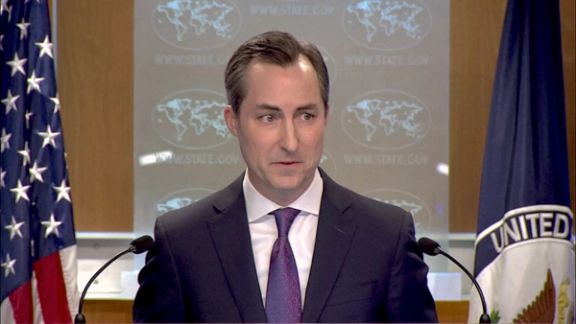
The United States can freeze $6 billion in Iranian funds released in a prisoner swap deal into Qatari accounts if needed, according to the State Department.

The United States can freeze $6 billion in Iranian funds released in a prisoner swap deal into Qatari accounts if needed, according to the State Department.
In August, the United States agreed to unblock $6 billion of Iran’s money frozen in South Korea for the release of five US dual nationals held hostage by Tehran, insisting that the agreement restricts the funds to purchases of food and medicine.
However, the State Department’s statement came after Iran’s President Ebrahim Raisi told NBC News that the money will be spent on whatever the Iranian people need.
"This money will be budgeted for those needs and the needs of the Iranian people will be decided and determined by the Iranian government," Raisi said.
Although some Iranian officials have acknowledged that the funds can be spent only for “non-sanctionable” goods, the foreign ministry insisted early on that Iran can do whatever it wanted with the released money.
"The Treasury Department has strict oversight over the use of those funds. We have visibility into how they are used, and we have the ability to police their use," State Department spokesperson Matthew Miller told reporters, adding that the criterion is that the funds be spent for humanitarian purposes.
The funds are currently being transferred from South Korea to Qatar via Switzerland and the hostages will be allowed to leave when all the money is deposited in a special Iranian account in Qatar.
There has been strong criticism of the Biden administration’s move in Congress. Many Republicans have accused the White House of caving in to Iran and by offering a large ransom endangering the lives of other Americans.

Criticism is raining down on the White House after its release of $6 billion into Iran’s coffers on 9/11 in addition to freeing the regime's men caught in the US.
After months of secrecy surrounding the Biden administration’s clandestine agreement with the regime in Tehran, new information was disclosed on Monday, a very disturbing timing for Americans marking the anniversary of the 9/11 and for Iranians readying for the anniversary of the Women, Life, Freedom protests.
The US Congress was informed on September 11 that Washington had cleared the way for the release of five American citizens detained in Iran by issuing a blanket waiver for international banks to transfer $6 billion in frozen Iranian money from South Korea to Qatar without fear of US sanctions. In return, five Iranians held in the US will also be released, four charged with sanctions violations and a fifth, acting as an unregistered foreign agent of Iran.
Both Washington and Tehran since announcing the prisoner release deal in August were hinting that the deal and the unblocking of the funds were separate issues, but the waiver document released Monday clearly links the two as one agreement, rendering the whole scheme a ransom payment. It also raises serious questions as to how the administration has skirted legislation that requires approval of Congress before taking such action. The Iran Nuclear Agreement Review Act was passed in 2015, and gave Congress the right to review all agreements with Tehran.
Senator Tom Cotton (R-AR) calls it “shameful” that President Joe Biden first used 9/11 as an excuse to flee Afghanistan and “now he desecrates this day by paying ransom to the world’s worst state sponsor of terrorism.”
Senator Bill Hagerty (R-TN) seconded the reprimand, saying that “on the 22nd anniversary of 9/11, the biggest terrorist attack on US soil, President Biden is waiving sanctions and allowing the transfer of $6 billion in frozen funds for a ransom payment to Iran, the world’s biggest terrorist sponsor."
Senator Ted Cruz (R-TX) decried Biden for keeping the Congress and the American people in the dark about the deal. “Today’s news confirms there has already been a side deal including a $6 billion ransom and the release of Iranian operatives,” he said, adding: “The Biden administration must keep their deal secret because if they disclosed it, the law requires them to come to Congress and defend it, and this appeasement is utterly indefensible.”
Representative Cory Mills (R-FL) vehemently opposed the decision that will “ultimately fund terrorist activities” against Americans and their allies. “This is Obama 2.0 and the same policy failures that resulted in Iran’s advancements in nuclear weapon technology, uranium enrichment, and billions to Iran in the failed JCPOA,” referring to the 2016 deal Obama made sending $400 million in cash to Iran in exchange for four American prisoners.
“The Biden regime in the matter of days has embarrassed us...releasing $6B to a terroristic regime who’s politically aligned to China while ignoring the 9/11 anniversary sites on what is the worst terrorist attack in US history,” he added.
US Senate Foreign Relations Committee Ranking Member Jim Risch (R-ID) reiterated that this deal “creates dangerous incentives to capture Americans abroad, provides Iran a cash windfall as it continues to attack US troops and sell drones to Russia.” He pointed out that striking such a deal “is tone deaf on the anniversary of Mahsa Amini death," which sparked the boldest challenge against the regime that shaped the Women, Life, Freedom movement.
Iranian political commentator Reza Taghizadeh described the deal as a slap in the face of Iranians who have revolted against the regime and a betrayal to the blood of 600 people killed during the regime’s crackdown on protests since September and the death of Mahsa Amini.
The five Iranians' identities were revealed Monday by Al-Monitor citing the Islamic Republic’s mission to the United Nations, Kambiz Attar Kashani, Mehrdad Moein-Ansari, Reza Sarhangpour Kafrani, Amin Hasanzadeh, and Kaveh Afrasiabi.
Kashani is an engineer who in February was sentenced to 30 months in prison for allegedly sending electronic equipment and technology to the Iranian government, including the Central Bank of Iran, using front companies in the United Arab Emirates. Moein-Ansari is a resident of the United Arab Emirates and Germany and was sentenced in September 2021 to five years in prison for his role in a scheme to obtain sensitive dual-use items that could have been used for nuclear weapons, missile guidance and development, and other military purposes.
Sarhangpour Kafrani, aka Reza Sarhang, is a Canada-based Iranian charged in July 2021 with illegally exporting laboratory equipment to Iran. Hasanzadeh is a US permanent resident living in Michigan, who was indicted in December 2020. Federal prosecutors accused Hasanzadeh, an engineer, of stealing confidential information from his employer and sending it to his brother in Iran, who had ties to the Islamic Republic’s military.
Kaveh Lotfolah Afrasiabi was a Boston-based political scientist and author, arrested by the FBI in January 2021 on charges of working as an unregistered agent of the Iranian government, and was charged in with violating the law that requires individuals acting as foreign agents in the United States to register with the US government.
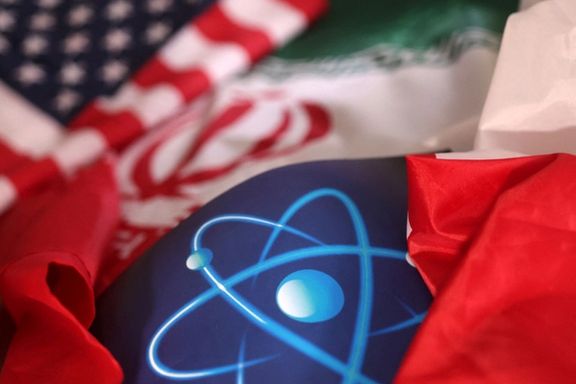
Iran’s chief nuclear negotiator and Deputy Foreign Minister Ali Bagheri-Kani has defended negotiations with the West as a means of securing “national interests.”
During a speech on Monday, Bagheri-Kani leveled criticism at opponents of negotiations, accusing them of stripping the regime of a vital and crucial “instrument for securing national interests.”
His remarks came amid an ongoing debate among the country’s politicians regarding the approach towards international negotiations over the country’s nuclear program. Bagheri-Kani's support for diplomatic interactions with the West seemed contrary to what his political camp was pushing for when hardliner Saeed Jalili was the secretary of the Supreme National Security Council (2007-2013) and former president Hassan Rouhani held office (2013-2021).
Bagheri-Kani was a protégé of hardliner Jalili, who was traditionally opposed to any accommodation with West and has been playing an influential role among Iran's hardliners who were incessantly attacking Rouhani over the JCPOA nuclear deal.
But Bagheri-Kani now maintains that Tehran sees negotiations as a vital means to secure national interests. “The redline in criticizing the government’s foreign policy is safeguarding national interests, not individuals or institutions,” he added.
“Foreign policy is not a realm of emotions but rather a field of beliefs, rationality, and intelligence," Bagheri-Kani said addressing a group of university professors. He pointed out that some try to portray "security and development" as being in conflict with "commitment to ideals and values," explaining that “sustainable security and development" is, in fact, contingent upon "adherence to ideals and values."
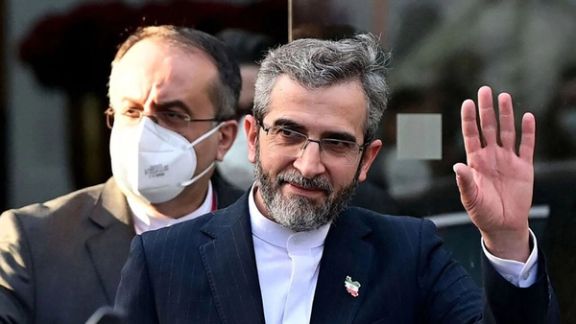
In a clear jab directed at hardliners, he said, "Those who, under the guise of defending values, seek to portray negotiations as fundamentally opposed to values are essentially aiming to deplete the regime's hand in utilizing this key and vital tool for national interests,” he stated.
Emphasizing that there is no obstacle to the talks aimed at reviving the 2015 nuclear agreement --officially known as the Joint Comprehensive Plan of Action (JCPOA), he said, "The Islamic Republic of Iran sees no obstacle to resuming negotiations and finalizing an agreement if the other parties act realistically and prevent repeating the past mistakes."
"The administration has never blocked the path to diplomacy, negotiations and efforts to secure the national interests through achievement of a balanced agreement," the senior diplomat said.
World powers were in talks in Vienna for 11 months in 2021-2022 to revive the 2015 Iran nuclear deal. The negotiations collapsed in March 2022 over Tehran’s demands that the Revolutionary Guards be removed from a US list of foreign terrorist organizations and ‘guarantees’ to cushion its economy and nuclear program from the US again leaving the accord. The Biden administration has been striving to bring the United States back into the JCPOA, a deal that was previously abandoned under the Trump administration.
Recently, Washington and Tehran reached a contentious agreement, whose details have been concealed from the public as well as lawmakers in Washington. The deal entails the release of five American prisoners detained in Tehran in exchange for five Iranian prisoners held in the United States as well as the release of $6 billion of frozen Iranian assets.
As a first step in this deal – which followed a two-year mediation effort by Qatar and Oman -- Iran on August 10 released four imprisoned US citizens from Evin prison into house arrest, where they joined a fifth already under home confinement.
These include businessman Siamak Namazi, 51, Emad Sharqi, 58, and environmental activist Morad Tahbaz, 67, who holds British nationality in addition to Iranian citizenship. The identities of the fourth and fifth Americans who either left prison or were under house arrest have not been disclosed.
Earlier in the day, the head of the UN's nuclear watchdog, IAEA's Rafael Grossi, said that bilateral talks between Iran and the United States could "provide clarity" and be beneficial.
Speaking at a news conference during the International Atomic Energy Agency 's (IAEA) 35-nation Board of Governors meeting in Vienna, Grossi acknowledged that Washington has informed the International Atomic Energy Agency of confidential talks with Iran, but he clarified that he is not privy to the details. He also added that Washington might be discussing the 2015 JCPOA nuclear deal with Tehran but the IAEA has a host of outstanding issues with Iran, including monitoring of its nuclear activities.
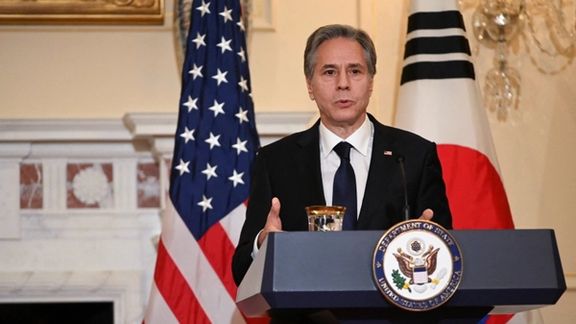
US Secretary of State Antony Blinken has signed a sanction waiver to allow the release of $6 billion of Iran’s frozen assets in a hostage release deal with Tehran.
The move will allow the funds blocked in two South Korean banks to reach Qatar without violating US banking sanctions imposed on Iran. According to the State Department document, Secretary of State Blinken determined that waiving the sanctions was in the national security interests of the United States.
Sources told AP that Blinken had approved the waiver last week, but Congress was only informed on Monday.
Both Washington and Tehran since announcing the prisoner release deal in August were hinting that the prisoner release deal and the unblocking of the funds were separate issues, but the waiver document clearly links the two as one agreement.
"Allowing these funds to be transferred from restricted Iranian accounts held in the (Republic of Korea) to accounts in Qatar for humanitarian trade is necessary to facilitate the release of these US citizens," the document said.
The news about the waiver came hours after an EU Commissioner expressed deep concern over the situation of Johan Floderus, a Swedish diplomat detained in Iran more than 500 days ago.

Floderus seems to be yet another victim of Iran's 'hostage diplomacy'. His case was kept secret for a long time by Sweden and the European Union in the hope that silence would secure his release.
On Monday, Ylva Johansson, the EU Commissioner previously responsible for Floderus's work, publicly addressed his case for the first time. "I'm very sad. I'm very worried," she said, “let’s hope that we can have him home soon”.
The long-kept secret of Floderus' plight first came to light in a New York Times report on 1 September. Shortly after, his family broke their silence and set out some details of his mistreatment in prison, including 24-hour lighting in the cell and over 300 days in solitary confinement.
Floderus turned 33 in prison last week.
In a statement published by a Swedish newspaper, Floderus’ family said he had spent some time in Iran on EU official business and had no issues. Sometime in early April 2022, he went back to Iran for vacation with his Swedish friends. On 17 April, he wanted to fly back home but was detained at Tehran’s international airport.
It’s not clear if Floderus had been advised against traveling to Iran on a personal capacity.
He has now joined a long list of foreigners and Iranian dual-nationals who in recent years have been detained in Iran and used as bargaining chips to force prisoner exchange or financial concessions.
Early August, four US dual-nationals were released from prison into house arrest in Tehran. Blinken said at the time that the move was the first step of a process to fly them home.
Opponents of the prospective deal say it encourages the Islamic Republic to detain more American and EU citizens.
Michael Rubin, a senior fellow at the American Enterprise Institute and a former Pentagon official, is a vocal critic of what seems to be the current EU/US policy towards Iran.
In a piece for Washington Examiner on Monday, he wrote: "When Iran brings a gun, Biden and his European partners wave cash. No wonder it is open season for Americans and Europeans worldwide."
Rubin lamented the 500-day silence over Johan Floderus' detainment and suggested that the authorities in Iran are looking to "trade him for Hamid Nouri".
Nouri is a former official of the Islamic Republic Judiciary who was arrested in Sweden and is now serving a life sentence for his involvement in the mass execution of up to 5,000 Iranian political prisoners in 1988.
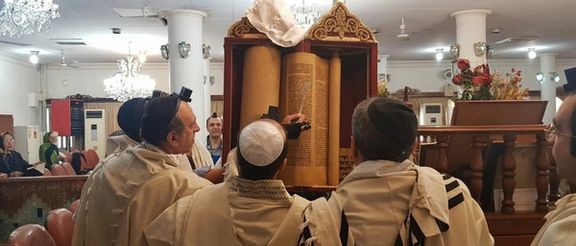
The one-year anniversary of Mahsa Amini’s murder coincides with the Jewish New Year on September 16, prompting community leaders to warn Jews to stay off the streets.
In a Telegram posting from Iran’s Jewish community on Sunday, the leadership wrote “All worshipers are strongly requested to refrain from stopping and gathering in the streets for any reason during Rosh Hashanah and after performing religious duties in synagogues.”
Alireza Nader, an Iran scholar based in Washington, DC, told Iran International, “The remaining few members of the Jewish community in Iran live in constant fear. Any sort of public pronouncement or guidance from their leadership should be seen in light of the community’s extreme vulnerability.” Nader has written about the persecution of Iranian Jews.
Beni Sabti, an expert on Iran from the Israeli National Security and Strategy Institute, who first located the Telegram post, told Iran International that the Jewish leadership is “worried that Jews can be in trouble if they stay in the streets” and urged them “to rapidly go from the synagogues to their houses.”
Sabti is a Tehran-born Jew who speaks fluent Persian and has extensively documented the Iranian regime’s repression of the country’s tiny Jewish population, which is estimated to number 9,000 members.
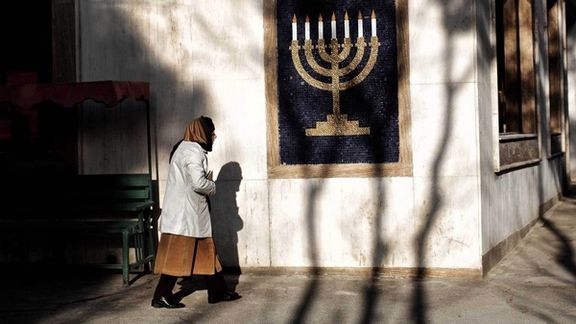
In April, Iran International reported that the Islamic Republic ordered Jews to participate in the antisemitic al-Quds Day rally during the Jewish holiday of Passover.
Sabti said the situation with Rosh Hashanah is comparable to Passover because the Jewish leadership said at the time on its Telegram platform: “Please do not go for picnics or enjoyable activities on al-Quds Day.”
Sabti added, “It is like al-Quds Day. They have to show their loyalty. They use delicate words. They use the kind of words that the regime can’t be upset with them for. The regime and Jews understand it.
They don’t say directly there are protests. This would be forbidden. They go around it. This is the kind of cultural talking for people with a Persian background in Iran.”
Prior to Iran’s Islamic revolution in 1979, Iran’s Jewish population numbered at least 100,000, most of whom fled after Ayatollah Ruhollah Khomeini seized power.
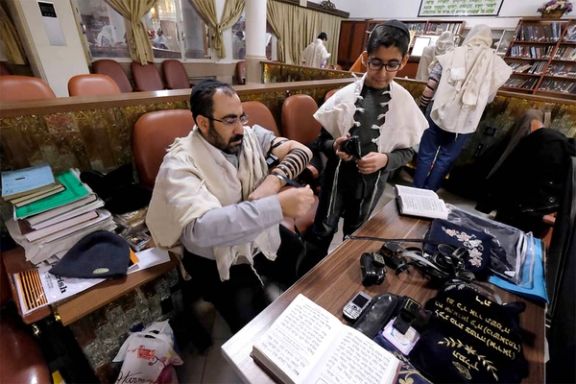
According to the Telegram post, the Jewish community wrote: “Coordination with the police force to create security and comfort for the grand ceremony of Rosh Hashanah .Respectfully, while congratulating in advance on Rosh Hashanah and wishing you a prosperous year, we inform you that by the grace of the Almighty and with the coordination made with the respected police force of Greater Tehran, the necessary arrangements have been made for the safety and comfort of our dear fellow believers for the celebration of the glorious and fateful day of Rosh Hashanah.”
Sabti noted the “Iranian Jewish leadership complimented the Iranian regime police. This is what they have to do.” He says the Iranian Jewish community has to “show they are loyal to the Iranian regime.”
The Telegram post noted “The public relations of the Tehran Jews Association, while thanking the loved ones of the police force for their unquestionable and constant help, has no doubt that the Kalimi community will once again draw a line against the evil plans of Iran's enemies and celebrate the magnificent ceremony of Rosh Hashanah away from any sidelines.”
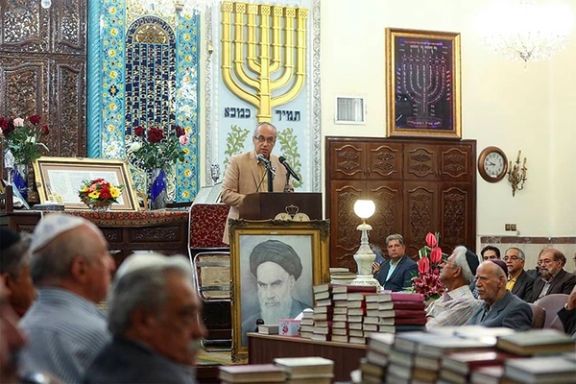
Sabti said the word Kalimi is a “polite word for Jewish” and “They don’t use the Jew because it means Zionist for the regime.” He said the Iranian word Kalimi can be loosely translated as the people from “Moses’s nation.”
Iran International exclusively reported in December that the Islamic Republic imposed pressure on religious minorities to compel them to condemn the uprising of the Iranian people following the murder of Amini in police custody.
Also in December, the regime arrested five Iranian Jews during the nationwide protests.
Iran’s regime and its foreign policy are based on an antisemitic world view, according to experts on the Middle East. The Middle East Media Research Institute (MEMRI) exposed Iran’s former foreign minister Mohammad Javad Zarif using an antisemitic term for Jews. “In a December 9, 2020 interview with Arman TV, Zarif used the antisemitic term for Jews – johood in Persian,” wrote MEMRI.
MEMRI noted, “A few days later, he attempted to cover up his statement with a dishonest attack on MEMRI. On December 16, he tweeted: ‘MEMRI has sunk to a new low in taking my pejorative usage of a word to accuse me of Antisemitism..."’
MEMRI added, “Foreign Minister Zarif is lying about Iran's positions on Jews and Israel. The MEMRI archives are full of research proving that the Iranian regime and its leaders are antisemitic and call openly for the annihilation of Israel.”
George Haroonian, one of the leading voices of the Iranian-Jewish community in the US, told Iran International "Contacting and coordinating with police in High Holidays is common practice wherever Jews are, but this announcement has some peculiar 'matters.' Who they mean by 'enemies' who might seize the occasion? Seems they are concerned about anti-Jewish elements within the country who might want to cause harm. As always, Jews are at the mercy of the regime."
He added, "I believe majority of Iranian people do not wish anything negative for Iranian Jewish community, but there is a minority who justifies their antisemitism based on variety of rationals. Based on Islamic beliefs as well as their hate for Israel."
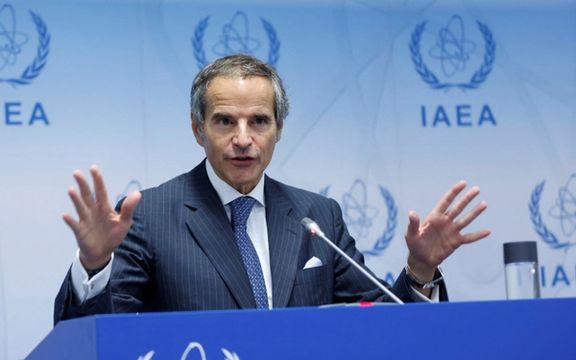
The head of the UN's nuclear watchdog, IAEA's Rafael Grossi, has said that bilateral talks between Iran and the United States could "provide clarity" and be beneficial.
Speaking at a news conference on Monday, Grossi acknowledged that Washington has informed the International Atomic Energy Agency of confidential talks with Iran, but he clarified that he is not privy to the details.
“We are aware that there is a bilateral process of sorts. We have been informed by the United States about this…and cooperation is good.” However, he commented on the nuclear part that "we are not clear about" what is being discussed/agreed. He also added that Washington might be discussing the 2015 JCPOA nuclear deal with Tehran but the IAEA has a host of outstanding issues with Iran, including monitoring of its nuclear activities.
He cautioned that his agency is not happy with how relations with Iran progress on the outstanding nuclear issues and has expressed its concerns in reports to the Board of Governors of the IAEA, as they hold their quarterly meeting this month.
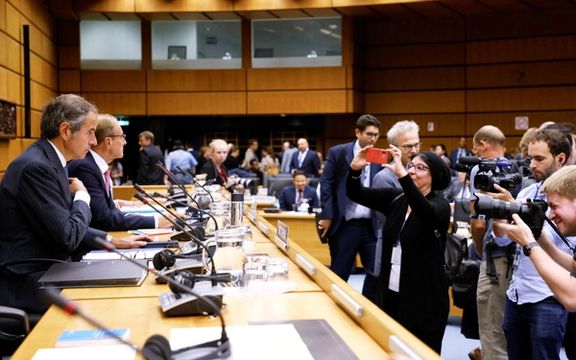
Iran and the United States announced a hostage release deal last month that also included the release of $6 billion in Iranian funds blocked South Korea due to US sanctions. Earlier, the US had also agreed to Iraq releasing $2.7 billion of its energy debts to Iran.
Western media began reporting that talks between the two countries go beyond a prisoner release agreement and the two sides are engaged in a “de-escalation” effort. Washington will allow the gradual release of all Iranian frozen funds, estimated to be around $20 billion and Iran would slow down its uranium enrichment.
The IAEA has reported to member states that Iran’s pace of enriching uranium to 60-percent purity has slowed in recent weeks, which could signal an understanding with the United States to de-escalate.
Asked about IAEA not having access to the data of monitoring cameras re-installed at an Iranian nuclear facility in Esfahan (Isfahan) in June, he acknowledged the reality and said that the issue is open for negotiations with Iran, but “at this time we are nowhere near this point,” Grossi announced. He acknowledged that the data from the cameras are important and “we need to reconstruct” what transpires at Natanz “as a baseline.”
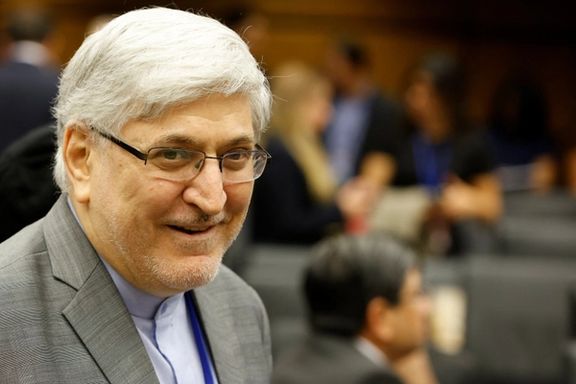
Behrouz Kamalvandi, the spokesman of Iran’s atomic agency, was quoted by local media June 15 as saying that ten of these cameras were re-installed in Esfahan’s Natanz facility, which is a major enrichment center, and apparently has a centrifuge production facility making the machines used in uranium enrichment.
Grossi also asked for more support from member states, emphasizing that IAEA depends on states to do its job.






